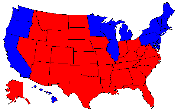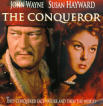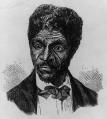![]()
 |
In the modern world, how difficult is it to come from nowhere, commit deeds of historical significance and then return to nowhere? Probably the most famous mystery man of the recent past interacted with the world only briefly. Nowadays, it takes a special effort just to avoid being photographed, so imagine how hard it would be to become someone else. | ||||
 |
A typically noncommittal article from CNN ("Well, these guys have a point, but then, these other guys have a point too.") has reminded me that it's time once again to remind people not to blindly trust Wikipedia. For example, it's now been over a month (Nov. 5) since I pointed out a significant factual error in the Wikipedia article on the Vietnam War. [They accidentally doubled the death toll of the war.] Although the article has been edited 80 times since then, no one has yet taken my advice. I suppose I could just jump in and edit it myself, but now I'm curious to see how long it will take for someone to notice. Normally I approve of collaborative volunteer Internet projects, but it worries me that Wikipedia is spreading like kudzu across the Internet, choking off all competition. I'm sure the good folks at Wikipedia are not directly responsible for this spamming of the Net, but they are promiscuous with their copyrights, and many commercial sites have learned that they can cheaply bulk up their content and increase their search engine visibility by looting Wikipedia. Thus has Wikipedia shifted from an ornamental shrub to an invasive weed. For example, when I Google a random phrase from Wikipedia's Vietnam War article, I get 301 hits. That's disturbing enough, but that phrase was removed from their article on October 19. This means that even after Wikipedia fixes a mistake or improves an explanation, they've left a trail of error all across the web. (To prove it's not a fluke, let's Google another random phrase ... Apparently, this one has been reposted at 236 different sites.) Wikipedia frequently has lopsided priorities. In their list of 20th Century events, they devote a full paragraph to the the 1953 coup in Iran and nothing at all to the arguably more important 1979 revolution in Iran.... Well, now that I look again, they don't even list the Wars in Vietnam and Korea as significant 20th Century events either. It's also a bit odd that in their biography of Robert E. Lee, they devote (by my count) 31 lines describing his death and 32 lines to his career as leader of the Army of Northern Virginia (much of which is taken up by a picture). If he were, let's say, the Black Dahlia or Sharon Tate, I would agree that how he died would be an important part of his historical significance, but, frankly, by the time he died, Robert E. Lee was a has-been. His importance was earned in the war, and they should be putting the emphasis there. Although Wikipedia sometimes gets criticized for giving too much credibility to, for example, holocaust deniers, that's not the biggest problem because a solid core of Holocaust admitters continually hover over vulnerable topics, re-edit the relevant articles and keep the truth of the Holocaust in plain sight. Less widely known atrocities, however, can disappear without anyone ever noticing. Six months ago (June 12), an anonymous neo-Confederate revisionist simply removed all mention of the Fort Pillow massacre, and no one has bothered to fix it. (I certainly can't, because that's not my job. All I know is that the current article as it stands is extremely wrong.) (Because of WP's ever-changing nature, by the time you read this, it might have changed. Click the WP article's "history" tab if you want to see how it looked when I wrote these complaints.) | ||||
 |
|||||
 |
This is scary. While watching "Sky Captain and the World of Tomorrow", which is set in the year 1939 of an alternate reality, and which is (there's no other word for it) just swell, we wondered, when did they start calling the Great War "World War I"? The next day, I went to the Oxford English Dictionary, which (as every librarian knows) is the authoritative source for word histories. All the small print seemed to say this:
But checking Internet, I discovered an earlier usage [use CTRL-F, then search "friendly bet"] of the term "First World War" -- Charles Repington's 1920 book of that title, which I confirmed by going to the catalog of the Library of Congress. Does this mean that the Internet is now a more reliable reference source than the OED? Or did I just misinterpret the OED? Hopefully, the latter. | ||||
 |
While hunting up some of the links above, I stumbled across the trailer for the new version of War of the Worlds, and there's good news, bad news and ambiguous news. The ambiguous news is that it's Steven Spielberg (who can be good when he isn't too sappy), and Tom Cruise (who annoys the hell out of me, but he stars in a surprising number of my favorite movies where his characters are supposed to be annoying, so at least he picks good projects and plays to his strengths.) The bad news is that the film isn't set in 1895 like it's supposed to be. I mean, would it kill them to have giant walking tripods clunking over the countryside, giving the arrogant British Empire its comeuppance? The good news is that the trailer's narration closely follows HG Wells's opening paragraph, so maybe they didn't rewrite the story too badly. After all, the best part of the original book was the sense that maybe the Victorian British had racked up some bad karma that was now barreling back at them across the gulf of space: "And before we judge [the Martians] too harshly we must remember what ruthless and utter destruction our own species has wrought, not only upon animals, such as the vanished bison and the dodo, but upon its inferior races. The Tasmanians, in spite of their human likeness, were entirely swept out of existence in a war of extermination waged by European immigrants, in the space of fifty years. Are we such apostles of mercy as to complain if the Martians warred in the same spirit?" If you want to read an interesting series of short stories, set in an alternate history where the Martians really did invade Earth in the late Nineteenth Century, you might want to find a copy of War of the Worlds: Global Dispatches. | ||||
 |
|||||
 |
With the American invasion of Iraq, I began to take a greater interest in the Roman Empire, and among other things, I discovered a pleasantly cynical series of historic novels: The SPQR mysteries of John Maddox Roberts. In the dying days of the Roman Republic, Decius Metellus, slightly disreputable and foolishly snoopy son of one of Rome's most powerful families, is always stumbling over dead bodies as the great players of the day maneuver for power in a struggle that will leave only one survivor as ruler of the known world. (not to give away the ending or anything, but one of our summer months is named after him (hint, hint)). Many of the characters and events are well-grounded in real history, and the author has a light, breezy style, so it's a relatively painless way to learn how the Republic became the Empire, and what American politics will be like fifty years from now. I guess my next step should be to read parallel series of mysteries by Steven Sayler. | ||||
 |
I know I shouldn't pick on Wikipedia, since I generally get good press from them (and I do occasionally contribute) but they are an endless source of irritating entertainment (and entertaining irritation) for me. See, for example, their discussion [scroll one click down] over how valid Stalin's "million deaths" quote is. Rather than, you know, looking in a book or something, they argue about whether anyone can remember hearing the quote any earlier than the Red Alert computer game in the mid-nineties. (And remember: 80% of your students, peers, children or future senators (as the case may be) are probably getting all their homework answers from Wikipedia.) On the plus side, the desire to accomodate every point of view-- no matter how eccentric -- creates some unique perspectives on the world. For example, where else would you find a list of the world's countries that includes 8 de-facto independent countries despite the objections of the Chinese or the Greeks? Or an up-to-date list of countries by political system that doesn't call Afghanistan a democracy or Israel fascist just because someone wants to prove a point? | ||||
|
16 Nov. 2004 | |||||
|
10 Nov. 2004 Did I show you this already? Blanding-Down History | |||||
 |
|||||
|
Last chance to call the 2004 election! In my case, last chance to force a strained historical analogy. Is President Bush another John Quincy Adams or Benjamin Harrison -- two extremely forgettable (*) presidential offspring who had been selected in controversial elections after losing the popular vote, and were defeated four years later in a rematch against their earlier opponents? Or is President Bush a rerun of William McKinley, who declared war on Spain after the USS Maine blew up in Havana harbor even though the Spaniards (probably) didn't do it. Then, somehow, a quick war of liberation in Cuba became a nasty war of conquest in the Philippines, and the President was re-elected. The third possibility is that President Bush is another Clinton/Reagan, each considered by his supporters to be the greatest president of the last 50 years, even though his opponents simply cannot fathom why he ever got elected in the first place. By the time you read this, we'll probably know. (I don't think it'll be a close vote, simply because it never goes the way you'd expect.) (* Yes, until Spielberg resurrected him for Amistad, no one ever remembered JQA.) | ||||
 |
History Topics Du Jour: the Charge of the Light Brigade and the Curse of the Red Sox. | ||||
 |
Most people learn their history from the movies. | ||||
 |
|||||
 |
Wow. I'm giving my highest recommendation for Isaac's Storm by Eric Larson -- four thumbs up. (I have prehensile feet.)(Eeeww...) It's the story of the worst day in American history -- the Galveston Hurricane of 1900. Trust me. The storm surge by itself would be exciting enough, but this author even makes the rudimentary science of 19th Century weather forecasting interesting. If you read only one history book this year -- well, it should probably be about something important, like how the Middle East got to be such a mess -- but if you want a history book that reads like a tragic novel, here you go. | ||||
 |
12 Oct. 2004 (While we're on the subject of Eric Larson and the Book of the Year Club ...) [make link] If you're going to read only one book on Herman Mudgett, the first and quite possibly creepiest serial killer in American History -- although I can't imagine why you'd want to limit yourself to just one -- skip Larson's Devil in the White City, and hunt up a copy of Harold Schechter's Depraved, instead. It's so obscure that I can't even find a decent online, non-commercial (Why should I plug Amazon for free? Go out and support your neighborhood bookstore.) review or online biography to link to, but it deserves a higher profile. | ||||
 |
Great Scott! I missed the moose. Also, I had forgotten that the President came, like, this close to announcing that the Constitution declared all men equal... [I'm sure I don't need to tell you, but that was the Declaration of Independence.] | ||||
|
Update! The votes are in! And they're a slight disappointment because, unlike the voters of NAVA, I like the flags of Milwaukee and Lubbock. On the other hand, I generally agree with their top tier of winners. | ||||
 |
"... the Dred Scott case, which is where judges, years ago, said that the Constitution allowed slavery because of personal property rights. That's a personal opinion. That's not what the Constitution says." -- President Bush, at the Second Debate. While I'm always happy to see a politician take a courageous stand against Washington's powerful pro-slavery lobby, I get the feeling that President Bush was groping for some example -- any example -- of judicial activism, but not one that only the conservatives gripe about. If he mentioned Roe v. Wade, Miranda, or Brown v. Board, it's bye-bye to the moderates. Aha! He remembers a name from long ago that he heard liberals griping about at some function he had to attend -- he blurts out Dred Scott -- after all, everybody disapproves of slavery -- but then he realizes he can't remember any details -- uh, some judges, like a hundred years ago, uh, said slavery was legal, but it isn't. | ||||
|
I didn't realize that August Strindberg was a real person (Sweden's greatest author!) and not just a cartoon character. | ||||
Copyright © 2004 Matthew White